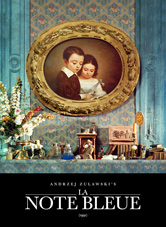


|
|

 |
|
La note bleue
(The Blue Note), 1992
Synopsis
Andrzej Zulawski's La Note Bleue can be called an event. This is probably the first time that a director has, in all humility, treated the life of a composer – Chopin in this instance – without sacrificing any of his ambitions as a filmmaker. In others words, not for a single moment does he attempt to appropriate or put to his own use the music he is filming. He directs it, and perhaps illustrates it, but in no way reduces it.
In La Note Bleue the music therefore serves neither as an excuse nor as a foil. It quite simply is. Invisible by nature, and yet terribly present. Mazurka, Nocturne, Funeral March... Notes heard time and again, but which here regain all their strength, ardor, and virtuosity. New notes altogether, it might seem, and yet profoundly melancholy.
Paul Claudel declared "the eye can listen." La Note Bleue proves him to be right, whispering to us that the "ear can see.



      

      
|